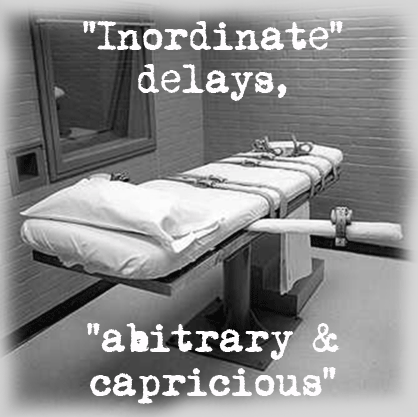
U.S. District Judge Cormac J. Carney ruled on Wednesday that California’s death penalty process is so absurdly long and drawn out—and ultimately arbitrary as a result—that it violates the Eighth Amendment to the U.S. Constitution prohibiting cruel and unusual punishment.
In his ruling Carney wrote:
“….the dysfunctional administration of California’s death penalty system has resulted, and will continue to result, in an inordinate and unpredictable period of delay preceding their actual execution. Indeed, for most, systemic delay has made their execution so unlikely that the death sentence carefully and deliberately imposed by the jury has been quietly transformed into one no rational jury or legislature could ever impose: life in prison, with the remote possibility of death.
As for the random few who actually are executed, Carney wrote, “they will have languished for so long on Death Row that their execution will serve no retributive or deterrent purpose and will be arbitrary.”
Carney, who was appointed by former President George W. Bush, overturned the death sentence of Ernest Dewayne Jones, a man sentenced to death in 1995 for the rape and murder of his girlfriend’s mother.
The judge noted that more than 900 people have received a death sentence in California since 1978, yet only 13 have been executed.
The ruling will likely be appealed by the state to the 9th Circuit and could go as far as the US Supreme Court. Some legal scholars are already betting that the Supremes will not side with Carney, and likely that is true, given the leanings of the present court. Yet, a full reading of Carney’s ruling (which you can find here) is interesting, in terms of the SCOTUS precedents he cites.
Another intriguing part of Carney’s findings is his flat contention that the interminable delays in arriving at a decision as to whether someone sentenced to death in the state of California is to be executed, are caused entirely by the state, not the inmate:
Most Death Row inmates wait between three and five years for counsel to be appointed for their direct appeal. After the issues are briefed on direct appeal, another two to three years are spent waiting for oral argument to be scheduled before the California Supreme Court. On state habeas review, far from meeting the ideal goal of appointing state habeas counsel shortly after the death verdict, at least eight to ten years elapse between the death verdict and appointment of habeas counsel. When that counsel is appointed by the State, investigation of potential claims is hampered by underfunding, which in turn slows down the federal habeas review process…..” And so it goes.
And just to be clear, Carney is in no way arguing against the appeal process, which he sees as essential—-because “…as the American tradition of law has long recognized, death is a punishment different in kind from any other”—-but to its utter dysfunction in California.
Ultimately, Judge Carney concludes:
Inordinate and unpredictable delay has resulted in a death penalty system in which very few of the hundreds of individuals sentenced to death have been, or even will be, executed by the State. IIt has resulted in a system in which arbitrary factors, rather than legitimate ones like the nature of the crime or the date of the death sentence, determine whether an individual will actually be executed. And it has resulted in a system that serves no penological purpose. Such a system is unconstitutional.
As mentioned above, this ruling will most likely be appealed to the 9th Circuit. (Kamala Harris is reportedly reviewing the ruling.) Carney did not, however, issue a statewide order with his ruling, but only overturned Jones’ death sentence, converting it to life without the possibility of parole.
Executions in California have been on hold since February 2006, when federal Judge Jeremy Fogel, then of San Jose, ruled that unsolved problems with the state’s lethal injection procedures, along with poor staff training, meant that the condemned were exposed to a botched and extremely painful execution, which was in violation of the Eighth Amendment.

The dysfunctional California legislature brought this to bare. Once again, in true Obama style, thwarting the will of the people. From a judicial perspective, I do not disagree with the judge’s position. Another pathetic example of dysfunctional government.